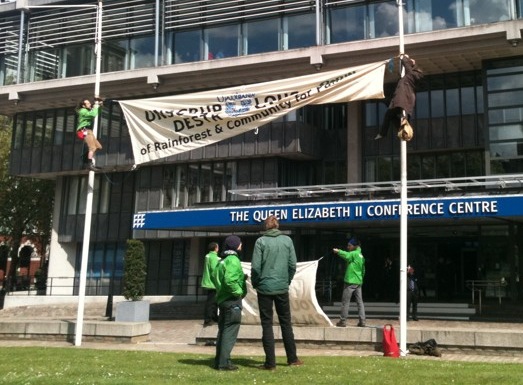 12 May 2010
12 May 2010
Following protests in Rotterdam and Hamburg yesterday, ROBIN WOOD activists protested today during Unilever‘s general assembly in London against tropical rainforest destruction for palm oil. A banner with the message “Unscrupulous Destruction of Rainforest and Community for Palm Oil” was unfurled in front of the entrance to the Queen Elizabeth Conference Centre. The activists additionally distributed information to the shareholders and demanded that they not absolve the board of directors of their ethical responsibilities concerning company purchases.
The Dutch-British company Unilever is the largest purchaser of palm oil worldwide, most coming from plantations in Indonesia. This cheap fat is an ingredient in products from Unilever brands such as Rama, Langnese and Knorr. Approximately 9.4 million hectares of land have already been transformed into palm oil plantations in Indonesia and this area is increased every year by approximately 600,000 hectares. The palm oil boom has drastic consequences due to the destruction of tropical rainforests which are irreplaceable for biodiversity and the worldwide climate.
Additionally, landgrab for giant monocultural plantations threatens the livelihoods of millions of people. “We want to put a stop to the palm oil boom. Unilever is the largest purchaser of palm oil worldwide and therefore a key player” said Peter Gerhardt, ROBIN WOOD’s rainforest campaigner. “For this reason in an open letter to CEO Paul Polman we demanded that Unilever require its suppliers to immediately cease expansion of their palm oil plantations. Otherwise the company will remain complicit in environmental destruction, climate change, and human rights violations.”
One of Unilever’s largest suppliers of palm oil is Wilmar Intl. Wilmar Intl. owns huge palm oil plantations in Indonesia, plans to expand further, and doesn’t shy away from the use of violence in order to succeed in their expansion plans. “During our research trip to the Indonesian province of Jambi in 2009, local villagers told us of instances where Wilmar’s henchmen threatened them with weapons in order to get them to give up their land for new palm oil plantations,” reports Gerhardt. These are not isolated instances. The World Bank discontinued funding of palm oil plantations in part due to massive land conflicts between local villagers and Wilmar Intl. “We demand a ban on the establishment of new palm oil plantations,” said Nordin, an Indonesian environmental activist working together with ROBIN WOOD. “We are dependent on the forest for protection against flooding, ecosystem stability, and for our own livelihoods and food.”
Unilever attempts to appease its critics and customers with a promise to buy more RSPO-certified palm oil. Palm oil would be certified by the RSPO (Roundtable for Sustainable Palm Oil) when it is allegedly produced in a sustainable manner. However, the standards required to receive RSPO certification are unconvincingly lenient. For example, logging of rainforest for the establishment of new plantations is even allowed. Most palm oil companies which are involved with the RSPO follow an aggressive course of expansion to the detriment of unique natural ecosystems.
(The open letter to Unilever’s CEO and ROBIN WOOD’s report from the research trip to Indonesia can be found at http://www.robinwood.de/tropenwald)
Contact email: presse@robinwood.de
